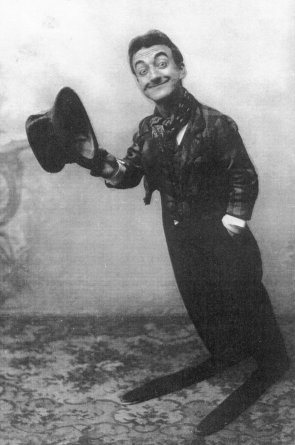Harry Relph
('Little Tich')

Little Tich in his famous boots
Among the stolid ranks of Establishment worthies buried in East Finchley Cemetery is a quite different figure, one of the greatest music-hall comedians: Little Tich.
Tich was born Harry Relph in 1867, in Cudham, Kent, the sixteenth child of a seventy-seven-year-old father. He had five fingers and a thumb on each hand, and he never grew above four foot six tall. (When Tich's own son was born, a doctor told the worried clown, 'It's all right, my little man: you've got a baby brother.')
He took his stage name from a supposed resemblance to Arthur Orton, 'the Tichborne claimant', the false heir to a baronetcy, and he himself later gave rise to the adjective 'titchy'.
Tich was involved in show business from the age of thirteen, and he made his first solo London music-hall appearance in 1884.
By then he had already begun to develop the boot routine for which he became famous. In two large, flat, heavy clogs, over half as long as he was, he would dance, lean almost horizontal to retrieve his lost hat, and finally rise on tiptoe to become over seven foot tall, before taking his bow with another quick horizontal lurch which knocked his bald forehead against the stage.
Other parts of his act included comic monologues ('I am a bolger sold – I mean a soldier bold . . . ') and a variety of characterizations such as a pompous prosecuting counsel, a bronchitic burial-society agent, and the fiery señorita 'Little Miss Serpentine'. He also appeared in pantomime. In Cinderella, as an Ugly Sister refused entrance to the ball, he had a sudden inspiration: 'I know – let's walk in backwards and they'll think we're coming out.'
After great success in the United States and in panto with Marie Lloyd and Dan Leno, in 1896 he made his debut in Paris, where he became a good friend of the equally short Toulouse-Lautrec and was rapturously admired by, among others, the celebrated actor-manager Lucien Guitry and his actor/dramatist son Sacha. The young Charlie Chaplin, in Paris with Fred Karno's Troupe, saw Tich at the Folies Bergère and based his walk on him – though later Chaplin became so famous that the debt was often taken to be the other way round.
Offstage, Tich was a skilled painter in oils and water colours, played the cello and composed music for his act, was an accomplished linguist, and read widely. After a show, he said, it was 'a quiet supper, a whisky, a page or two of Montaigne – and bed-oh!'
His genius was widely acknowledged. The young Neville Cardus, assigned to review a forthcoming Little Tich appearance for the Manchester Guardian, which took such things seriously, was told to prepare for it by a long, meditative walk in the country.
In 1910 Tich was made an officer of the Académie Française for services to French music-hall, and in fact it is the words of a French tribute on his death (in Hendon) in 1928 that appear on his tombstone: 'le plus petit et le plus grand comique du monde'.